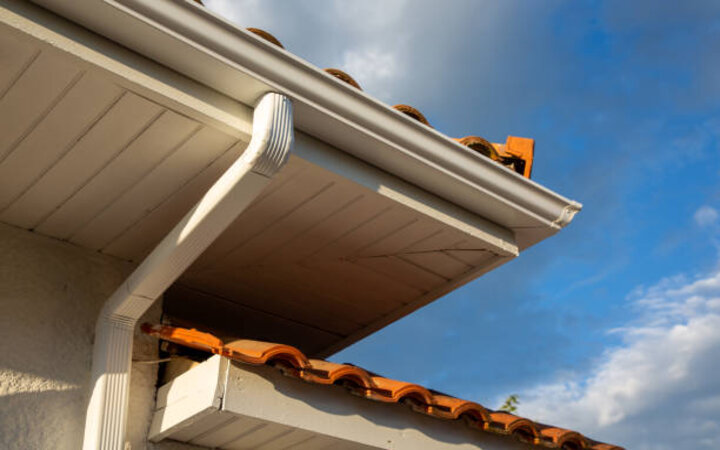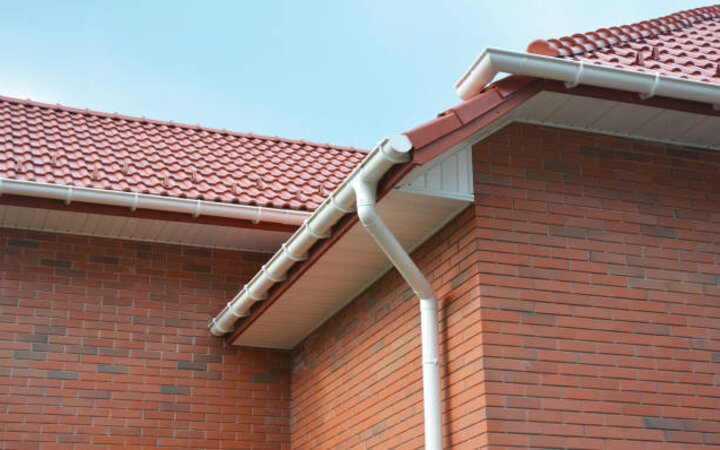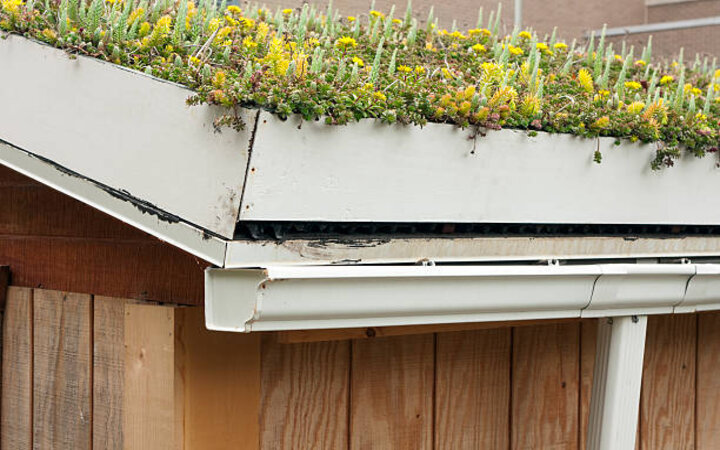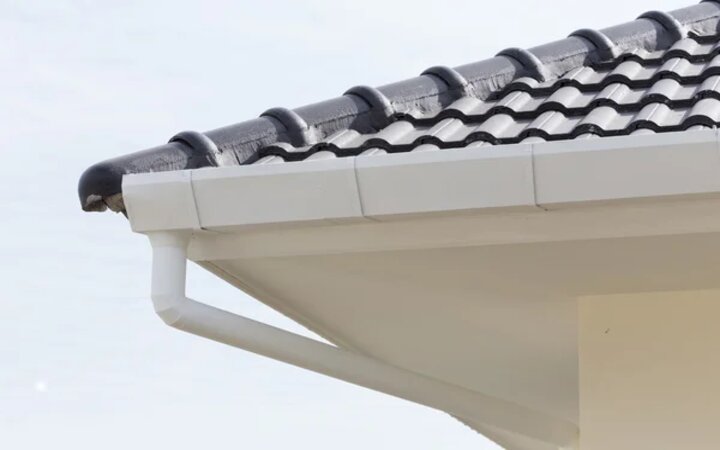A Rain gutter is a structure designed to catch rainwater, sleet, and meltwater from the roof of the home or overhanging objects like trees. The gutter then redirects the water flow via a series of interconnected channels leading away from the home.
They are actually very important in the home and do more than just keep water from drenching you as you step into your home. Rain gutters direct water away from your sidings and foundation, reducing the risk of water damage to your home. From window rot to erosion in the foundation, to basement flooding, and to the development of mold.
Though all gutters perform similar tasks, they are different types of rain gutters by style and material and each has its benefits and drawbacks. This guide should shed more light on the various types of rain gutters by style and material to help determine the best fit for your home.
Types of rain gutters
By Style
1. K-style gutters

One of the most common gutter styles is the K-style gutter. They come in standard sizes of 5-inch to 6-inch widths featuring rectangular downspouts (downspout is the side of the gutter running vertically down the side of your home). K-style gutters are best suited for modern homes and specifically for areas with rainy climates.
Benefits
- It is an affordable option
- Due to their depth, they can carry large amounts of water with reduced chances of water spills
- Enhanced structural strength
- It gives the home a modern appearance
Drawbacks
- Because of their depth, it can be difficult to clean
- Requires frequent maintenance even more than other gutter types
- They are prone to clogs caused by leaves, sticks, and other debris
- The top lip can collect mold and mildew as well
- Prone to corrosion
2. Custom fascia gutters

Another popular gutter style is the custom fascia gutters. They are custom-built gutters made from aluminum and offer a sleek contemporary look to the home. Custom fascia gutters are made to match the roof’s dimensions and pitch but tend to cost more than other types of gutters.
Benefits
- Can handle heavy water flow
- Aesthetically appealing
- Can match any home style or design
Drawbacks
- It can cost more than twice the amount of other gutter types
- Requires more cleaning and maintenance
- Cleaning is difficult
- Installation is also very tricky
3. Box-style gutters

Box-style gutters are commonly used in commercial buildings or multi-unit residential properties. However, they are still used for single residential homes where extra water volume capacity and durability are needed.
Benefits
- Extremely durable
- Ideal for homes with large roofs
- They can withstand heavy downpours or large water volume capacity
- Can handle heavy meltwater after a snowstorm
Drawbacks
- Might not be aesthetically appealing since it is not hung on the edge of your roof, rather, they have a high back section that tucks under your roof’s shingles
- Very expensive
4. Half-round gutters

Half-round gutters are one of the most effective gutter types. Due to their unique round shape, they are able to clear debris more effectively. They are often used for brick homes and historical or older homes as they offer a more traditional look to the home.
Benefits
- Give the home a sleek traditional aesthetics adding to the curb appeal of the home
- Very durable
- Well suited for areas that experience heavy downpours regularly
- Less likely to rot and corrode
- Easy to clean
Drawbacks
- Not budget-friendly
- Easier to damage if not maintained adequately
- Takes longer to install
- Heavier than others so it runs the risk of pulling loose quicker
By material
Now that you are familiar with the different types of home rain gutters by style, let’s look at the various materials that one can use for rain gutters.
1. Aluminum gutters
Aluminum is one of the most used rain gutter materials for many reasons; it is affordable, easy to use, and is a generally available product. What’s more, they are rust-resistant and can be painted in any color to match the design or aesthetics of your home.
Benefits
- Relatively cheap
- Product availability
- They don’t rust
- Lightweight, making it easy to install
- Available in various colors and can also be painted
- Has a lifespan of between 20 – 30 years
Drawbacks
- Can dent or bend
- Prone to damage, it can cave if a tree branch falls on it and will have to be replaced
- Can warp
2. Copper or zinc gutters
Metal (copper or zinc) is a premium gutter material that looks great and has natural properties that can resist the element. They have a life expectancy of between 50 to 80 years (maybe less if you live near the ocean or anywhere with a salty atmosphere) and are best suited for historic or high-end homes.
Benefits
- Long-lasting
- Does not rust, warp, or fade
- Develops a beautiful patina over time
- Rust-resistant
- High- and low-temperature resistant
Drawbacks
- Intolerant to salty air or acidic runoff (like those from cedar-shingled roofs)
- Difficult installation (not DIY-friendly)
- Not budget-friendly
- Heavy so they come loose more often
3. Galvanized steel gutters
Galvanized steel is more durable and sturdy than aluminum steel, making it an ideal material for home rain gutters. It is also resistant to rust and can withstand heavy rainfall but has a slightly lower lifespan expectancy. Galvanized steel rain gutters are ideal for homes that experience heavy rainfall and wet weather conditions.
Benefits
- Can withstand all types of weather
- Moderate lifespan (20 -30 years), depending on how you maintain it
- Can be painted to match the aesthetics of the home
- Holds up against dents better than aluminum
Drawbacks
- The installation has to be done by a professional (not DIY-friendly)
- Heavy and can fall loose
- Expensive
4. Vinyl gutters
Another common rain gutters construction material is vinyl, plastic, or PVC because it is inexpensive, simple to install, and water-resistant. Once installed, you will find out that vinyl gutters work effectively in both moderate climates.
Benefits
- Waterproof
- Inexpensive
- Easy to install
- Rust and corrosion-proof
- Requires low maintenance
Drawbacks
- Prone to sagging and cracking
- It Can crack if exposed to a hard freeze temperature
- It Can crack if weight is placed on it, eg if a ladder is placed on it
- Does not last as long as other rain gutter materials
FAQs
What type of rain gutter material is the cheapest?
In terms of price, Vinyl is the cheapest material used for rain gutters, however, they have a slightly lower lifespan.
How often do rain gutters have to be cleaned?
It is usually advisable to clean the rain gutter 2 to 3 times a year. But if gutter guards were previously installed, then once a year should suffice.
How long does a rain gutter last on a house?
The rain gutter’s lifespan is dependent on the type of material used and can last anywhere from 10 – 80 years after installation.
Can you replace a roof and not replace a gutter?
Although most homeowners would just replace both, it is not a necessity.
Why do homes need rain gutters?
By channeling water away from the structure, you reduce the risk of water damage to your home. This includes; sidings and foundation damage, mold, mildew due to moisture leaks, basement leaks, and trenching and erosion to the landscape.
Conclusion – Choosing the best type of rain gutter for your home
Choosing the best rain gutter for your home is a very delicate task. You want the very best, one that will get the job done and is conducive to the climate condition of your area. Zinc and Copper tend to be the best material for rain gutters because they last longer. However, if you are on a tight budget, you may find Vinyl and aluminum to be better choices.
That said, it is important to speak to a professional about the material’s conduciveness with the climate condition. You do not want to have to replace your gutter for at least the next 20 years so it’s only logical to consult a professional. Get in touch with us today let’s get the job done right.
Thanks for reading.